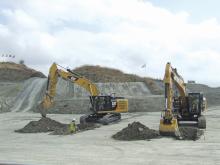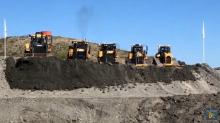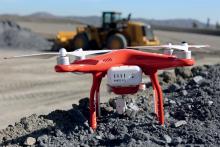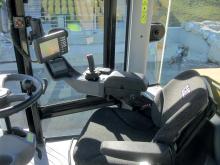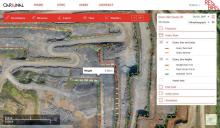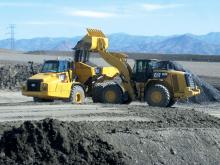Caterpillar vice president Paolo Fellin sums up the past year for the global equipment manufacturer and looks at the increasing importance of telematics and machine control. David Arminas reports from Caterpillar’s Demonstration and Learning Centre in Malaga, southern Spain
First the good news. Despite the difficulties, especially of the financial markets, 2014 was “a record year for a lot of things” for global heavy equipment maker Caterpillar.Now the bad news. Hang onto your seats because despite some
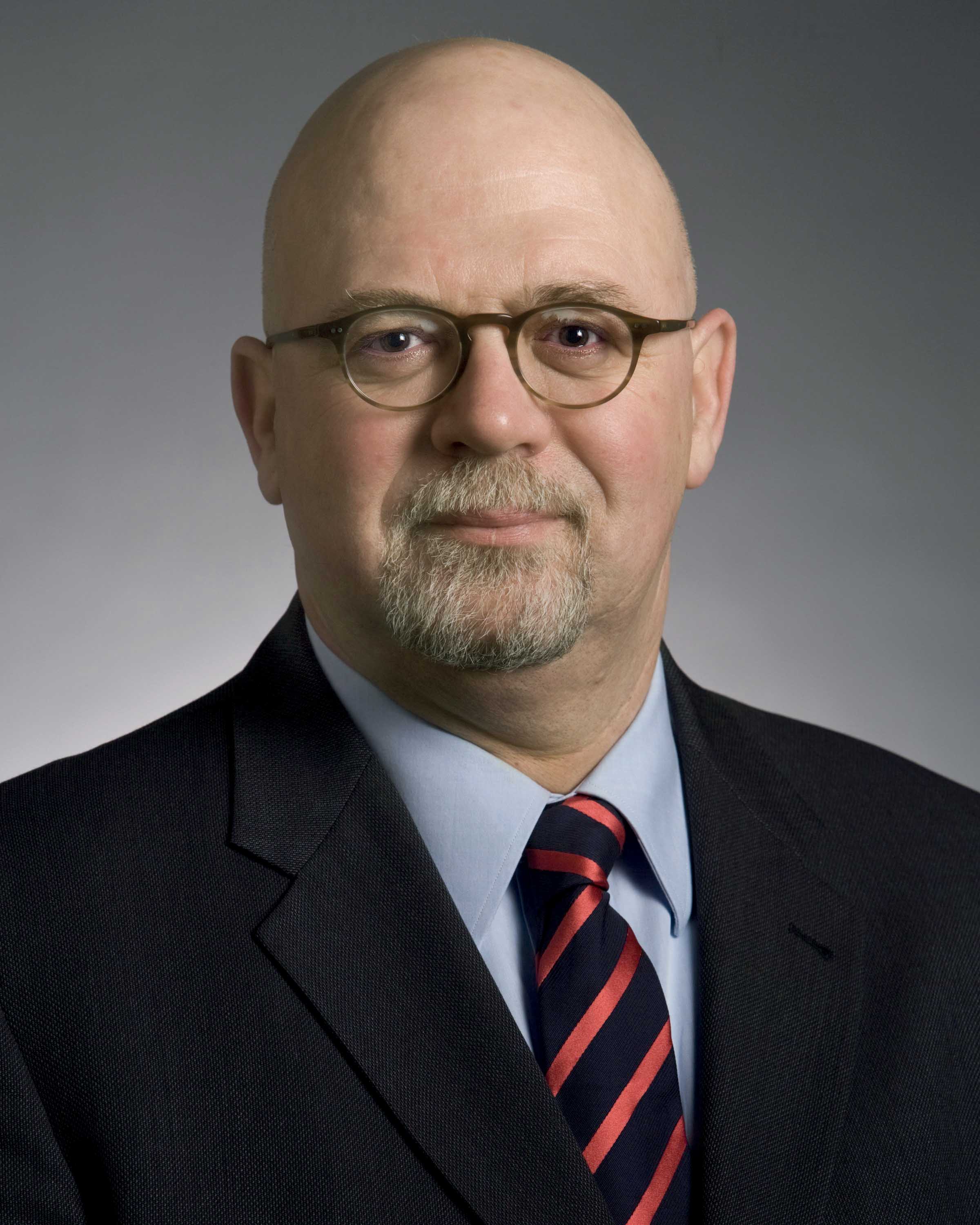
Caterpillar vice president Paolo Fellin
RSSCaterpillar vice president Paolo Fellin sums up the past year for the global equipment manufacturer and looks at the increasing importance of telematics and machine control. David Arminas reports from Caterpillar’s Demonstration and Learning Centre in Malaga, southern Spain
First the good news. Despite the difficulties, especially of the financial markets, 2014 was “a record year for a lot of things” for global heavy equipment maker178 Caterpillar.Now the bad news. Hang onto your seats because despite some improvements in the financial markets, all heavy equipment manufacturers face some pretty strong “headwinds” that could blow away sales expectations.
Indeed, in a year-end financial statement the US-based group pinched back its revenue predictions by 10% for 2015, down from an earlier $55 billion prediction to $50 billion. More will have to be done with less, Caterpillar’s vice president of Global Construction & Infrastructure Paolo Fellin told World Highways.
Even so, Caterpillar remains well placed to weather these global storms, many of them political, and Fellin is upbeat about the future. “We also increased the dividend by 17% and bought back $2.2 billion dollars of stock. But last year we celebrated for five minutes and then moved on to the next one [2015],” he says. “It’s a tough outlook with a lot of headwind.”
Ill winds are blowing for commodity prices whose tumble has meant production in the mining and resources sector has fallen off. This is especially true in Africa where a lot of government money for infrastructure projects comes from mining income. “I have a special spot for Africa because my first four years with Caterpillar were spent in Abidjan (Ivory Coast),” says Fellin, who was born in the Dolomites region of northeast Italy. “I cut my teeth working on broken machines, fixing machines and seeing customers in Africa.”
China, whose growth for years has been an engine that drove the global economy, is running out of steam. Brazil’s economy, too, has hit the buffers while political problems in Russia are hampering its relations with the rest of Europe and threatening the financing of business deals.
“We have never been as uncertain as we are now in a lot of areas. And then on top of that has been the oil crisis. About one-third of our revenue is from our energy and transportation division, one of the three pillars of CAT and which is heavily related to oil.”
On the other hand lower oil prices can reduce an equipment user’s fuel bill, putting more money back into the business for development. “But the benefit of lower oil prices is not felt immediately, there is a lag. People have to feel the benefit before they spend. It will be positive sometime, but we don’t know when.”
But North America has done well and is doing well, where Caterpillar traditionally gets around half its sales. “We are also expecting the US to be more proactive towards infrastructure development.”
But he says it’s risky relying on one region to make the books look good at the end of the year. “I would like to see Europe and Japan pick up right now, it’s about time. Africa is picking up, but Asia is still slow. It’s good for us when North America does well, but we wish other horses to pull at the same time.”
The first two or three months of the year in Europe are starting out well, says Fellin. “Europe in 2014 did better than 2013 and we expect it do better next year than 2014. But still, today Europe is probably 40% below the peak of a few years ago.”
China, though, is about 60% of where it used to be, he explains. “The excavator market in China two to three years ago, was 70,000-80,000 units overall. Now it’s more or less around 40,000 units predicted for this year. For 10tonnes and above, we’re number one in China for excavators and that has helped us in the past few years when the market fell down.”
For these reasons, Caterpillar had a rethink on its $55 billion revenue prediction, even though in the construction and infrastructure market the group should have about the same revenue if not slightly better than last year, he said.
Around $150 million in savings for 2015 should come from corporate restructuring. “Big gains we made last year were really from operations, considerable reduction of inventory within our own operation and we will continue to do that,” he says. “We’re going to have to rely on our profitability to be better than getting a top line. That is what we are working on right now.”
Part of the working smarter strategy is a focus on attending fewer exhibitions in favour of the three larger shows. “One in America,3485 Conexpo, one in EAME (Europe, Africa, Middle East) such as bauma, and one in Asia, which is bauma or another one,” he says. “That means we have one big show per year per major tri-sphere of the world.”
Out of all the market disruptions is emerging the trend for smarter machines as a way for users to protect their squeezed margins. “The big trend is technology,” he said. “When I go to see a customer, they never used to ask me about technology. Now they want the first half an hour to discuss it, what’s happening, what do I need to do, how do I gear up and do my competitors have this technology.”
But the buzz has moved on from the latest technical wizardry of machine design such as Caterpillar’s ACS valves in excavators that coordinate a machine’s pumps to the engine. Continuously variable transmissions and Tier 4 engine emissions certification which also gives improved fuel economy are now less the focus for technology discussions.
More and more telemetry is being added to machines to collect data on mechanical performance in order to use the machine more effectively, such as with Caterpillar’s Grade Control and Accugrade. The customer expects the machine to work well. Technology can minutely measure machine payloads, compaction measurements, estimate fuel savings and the number of kilometres to overhaul or recycle times.
In many machines, this connectivity also gives the client the opportunity to make the unit’s cab into the operator’s office-on-wheels. Data can be immediately transferred between, say, a Caterpillar loading machine and a crusher that will allow an in-cab printing of payload certificates.
Caterpillar also, in March, entered into a technology and predictive analytics agreement with Uptake, a provider of analytics software for the operation of machinery. Caterpillar, which made a minority investment of an undisclosed sum in Uptake, said it will jointly develop an end-to-end platform for predictive diagnostics to help its customers monitor and optimise their fleets more effectively.
Yet technology is much more now, with analytics that look at a machine as part of the client’s overall operations, such as in a quarry. How does the machinery integrate with the overall operations, affect movement of other machines and of personnel? What decides the quarry site layout, the roads and approach roads, road gradients? A small change in road layout to improve one machine’s effectiveness may have a negative effect on several other machines. And there is the safety aspect. Have injury risks risen with changes in quarry layout?
In one way, Caterpillar would be working almost as a consultant. If so, are customers ready to change how they work? “We are constantly working with customers on this,” says Fellin. “Once they figure out they can save money, they hop on it pretty fast.”
He cites an example where a customer in Europe was considering the purchase of a new 988 wheeled loader. But looking at the customer’s computer data on the activity of current machines, it was noticed some machines were idle much of the time.
”I said before you buy a new machine, maybe we should go to the quarry to find out why this machine is idle 65% of the time. It should be idle, say, 25% or something. That quarry site connectivity, or view of the quarry performance, is very important.”
One of Caterpillar’s most well-received new products for quarry work has been the 336F hybrid excavator, although sales were initially slow in Germany, he says. The 336F, which replaced the 336E that was introduced in 2011, has been a big success “because you are getting 20-25% less fuel consumption”. The biggest advance is not so much the hydraulic accumulators, it’s the ACS valve, which is being introduced in most of Caterpillar’s excavators. They coordinate operation between the engine, valves and pumps.
Caterpillar is not really looking at introducing new lines such as crushers for the quarry sector. “Every couple of years we look at them and decide not. But new CAT models such as the M-series are very good for quarry and aggregates,” he says. The six M Series models of medium-sized wheeled loaders include the new 982M and an XE version of the 972M. Fuel efficiency can be up to 10% more, according to Caterpillar data.
“But we are getting more serious about expanding in the demolition area of excavators,” says Fellin.
As for new or expanded production facilities, there is no news on the horizon. But aby new facility would almost certainly be a wholly owned Caterpillar operation. This is how the company operates, even in China, says Fellin, where Caterpillar has 14 factories.
“It’s the Caterpillar philosophy of having complete control over components, productivity, quality and we do it all ourselves. That’s who we are. We like to say not made in China, but made at Caterpillar.” RSS
First the good news. Despite the difficulties, especially of the financial markets, 2014 was “a record year for a lot of things” for global heavy equipment maker
Indeed, in a year-end financial statement the US-based group pinched back its revenue predictions by 10% for 2015, down from an earlier $55 billion prediction to $50 billion. More will have to be done with less, Caterpillar’s vice president of Global Construction & Infrastructure Paolo Fellin told World Highways.
Even so, Caterpillar remains well placed to weather these global storms, many of them political, and Fellin is upbeat about the future. “We also increased the dividend by 17% and bought back $2.2 billion dollars of stock. But last year we celebrated for five minutes and then moved on to the next one [2015],” he says. “It’s a tough outlook with a lot of headwind.”
Ill winds are blowing for commodity prices whose tumble has meant production in the mining and resources sector has fallen off. This is especially true in Africa where a lot of government money for infrastructure projects comes from mining income. “I have a special spot for Africa because my first four years with Caterpillar were spent in Abidjan (Ivory Coast),” says Fellin, who was born in the Dolomites region of northeast Italy. “I cut my teeth working on broken machines, fixing machines and seeing customers in Africa.”
China, whose growth for years has been an engine that drove the global economy, is running out of steam. Brazil’s economy, too, has hit the buffers while political problems in Russia are hampering its relations with the rest of Europe and threatening the financing of business deals.
“We have never been as uncertain as we are now in a lot of areas. And then on top of that has been the oil crisis. About one-third of our revenue is from our energy and transportation division, one of the three pillars of CAT and which is heavily related to oil.”
On the other hand lower oil prices can reduce an equipment user’s fuel bill, putting more money back into the business for development. “But the benefit of lower oil prices is not felt immediately, there is a lag. People have to feel the benefit before they spend. It will be positive sometime, but we don’t know when.”
But North America has done well and is doing well, where Caterpillar traditionally gets around half its sales. “We are also expecting the US to be more proactive towards infrastructure development.”
But he says it’s risky relying on one region to make the books look good at the end of the year. “I would like to see Europe and Japan pick up right now, it’s about time. Africa is picking up, but Asia is still slow. It’s good for us when North America does well, but we wish other horses to pull at the same time.”
The first two or three months of the year in Europe are starting out well, says Fellin. “Europe in 2014 did better than 2013 and we expect it do better next year than 2014. But still, today Europe is probably 40% below the peak of a few years ago.”
China, though, is about 60% of where it used to be, he explains. “The excavator market in China two to three years ago, was 70,000-80,000 units overall. Now it’s more or less around 40,000 units predicted for this year. For 10tonnes and above, we’re number one in China for excavators and that has helped us in the past few years when the market fell down.”
For these reasons, Caterpillar had a rethink on its $55 billion revenue prediction, even though in the construction and infrastructure market the group should have about the same revenue if not slightly better than last year, he said.
Around $150 million in savings for 2015 should come from corporate restructuring. “Big gains we made last year were really from operations, considerable reduction of inventory within our own operation and we will continue to do that,” he says. “We’re going to have to rely on our profitability to be better than getting a top line. That is what we are working on right now.”
Part of the working smarter strategy is a focus on attending fewer exhibitions in favour of the three larger shows. “One in America,
Out of all the market disruptions is emerging the trend for smarter machines as a way for users to protect their squeezed margins. “The big trend is technology,” he said. “When I go to see a customer, they never used to ask me about technology. Now they want the first half an hour to discuss it, what’s happening, what do I need to do, how do I gear up and do my competitors have this technology.”
But the buzz has moved on from the latest technical wizardry of machine design such as Caterpillar’s ACS valves in excavators that coordinate a machine’s pumps to the engine. Continuously variable transmissions and Tier 4 engine emissions certification which also gives improved fuel economy are now less the focus for technology discussions.
More and more telemetry is being added to machines to collect data on mechanical performance in order to use the machine more effectively, such as with Caterpillar’s Grade Control and Accugrade. The customer expects the machine to work well. Technology can minutely measure machine payloads, compaction measurements, estimate fuel savings and the number of kilometres to overhaul or recycle times.
In many machines, this connectivity also gives the client the opportunity to make the unit’s cab into the operator’s office-on-wheels. Data can be immediately transferred between, say, a Caterpillar loading machine and a crusher that will allow an in-cab printing of payload certificates.
Caterpillar also, in March, entered into a technology and predictive analytics agreement with Uptake, a provider of analytics software for the operation of machinery. Caterpillar, which made a minority investment of an undisclosed sum in Uptake, said it will jointly develop an end-to-end platform for predictive diagnostics to help its customers monitor and optimise their fleets more effectively.
Yet technology is much more now, with analytics that look at a machine as part of the client’s overall operations, such as in a quarry. How does the machinery integrate with the overall operations, affect movement of other machines and of personnel? What decides the quarry site layout, the roads and approach roads, road gradients? A small change in road layout to improve one machine’s effectiveness may have a negative effect on several other machines. And there is the safety aspect. Have injury risks risen with changes in quarry layout?
In one way, Caterpillar would be working almost as a consultant. If so, are customers ready to change how they work? “We are constantly working with customers on this,” says Fellin. “Once they figure out they can save money, they hop on it pretty fast.”
He cites an example where a customer in Europe was considering the purchase of a new 988 wheeled loader. But looking at the customer’s computer data on the activity of current machines, it was noticed some machines were idle much of the time.
”I said before you buy a new machine, maybe we should go to the quarry to find out why this machine is idle 65% of the time. It should be idle, say, 25% or something. That quarry site connectivity, or view of the quarry performance, is very important.”
One of Caterpillar’s most well-received new products for quarry work has been the 336F hybrid excavator, although sales were initially slow in Germany, he says. The 336F, which replaced the 336E that was introduced in 2011, has been a big success “because you are getting 20-25% less fuel consumption”. The biggest advance is not so much the hydraulic accumulators, it’s the ACS valve, which is being introduced in most of Caterpillar’s excavators. They coordinate operation between the engine, valves and pumps.
Caterpillar is not really looking at introducing new lines such as crushers for the quarry sector. “Every couple of years we look at them and decide not. But new CAT models such as the M-series are very good for quarry and aggregates,” he says. The six M Series models of medium-sized wheeled loaders include the new 982M and an XE version of the 972M. Fuel efficiency can be up to 10% more, according to Caterpillar data.
“But we are getting more serious about expanding in the demolition area of excavators,” says Fellin.
As for new or expanded production facilities, there is no news on the horizon. But aby new facility would almost certainly be a wholly owned Caterpillar operation. This is how the company operates, even in China, says Fellin, where Caterpillar has 14 factories.
“It’s the Caterpillar philosophy of having complete control over components, productivity, quality and we do it all ourselves. That’s who we are. We like to say not made in China, but made at Caterpillar.” RSS


